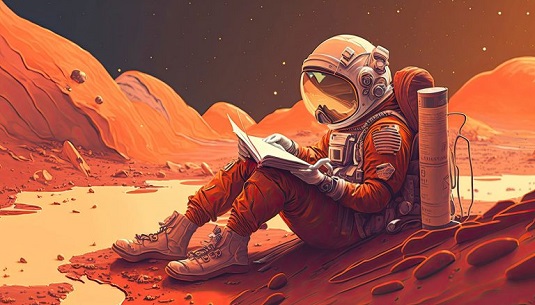
The Last Starship from Earth by John Boyd. Something of an obscure novel by an equally forgotten writer, my memory of this book hasn't grown fonder in the recall. This was the subject of a post for all the wrong reasons. Seemingly well-regarded by those who've heard of it (why?), the book comes with patronising 60s sexism and lechery, a heavy-handed critique of state managerialism, and the abrupt bolting on of a silly time travel story where the main character prevents Jesus from marching on Rome and helps founds the Christianity that inaugurates our timeline. Everything is made all the more insufferable by the narrative's belief in its own cleverness. A complete mess of a book.
Destiny's Road by Larry Niven. This is one I remember looking at in Waterstones when it came out in the late 1990s and thinking it sounded alright. Spiral Town is built around a road of molten rock laid down by the planet's early colonists, but it stretches off into the distance and no one knows where it goes. Until our lead character flees his home following a fatal fight with a merchant, and heading down the road is his only option. And what do we find there? 450 pages of tedium. I've read Niven before, but here he forgot how to write an interesting story. There are marriages, an exploration of merchant culture, a temporary spell in slavery, and we find out where the road ends up. But the revelation that the societies of Destiny are rigidly designed to ensure nutrient sufficiency is just about the lowest impact conceptual breakthrough I've encountered in SF. This is a minor Niven for good reason.
The Gap into Conflict/The Gap into Vision by Stephen R Donaldson. I've had occasion to to rant about these already. A space opera setting with rogues and pirates that flout the law, and corrupt space cops interested only in sustaining the corporate dictatorship that runs the joint. The plot centres on the misadventures of Morn Hyland and her relationship with two captors. But in both books, she is subject to frequent physical and sexual violence, much of which is unsparing in its description. If this wasn't enough, the so-called hero of the setting subjects her to gaslighting in-between the beatings and the rapes. Gruesome and entirely unnecessary, almost as if Donaldson added the violence to differentiate the sequence from the hum drum of ray guns and spaceship chases. Instead, all that he's accomplished is a repugnant reputation for himself.
Orbital Resonance by John Barnes. Another one that got the full review treatment, this is a poor attempt at literary SF. The action takes place on an interplanetary flight between Earth and Mars, and the tropes are there: future history infodumps, experimental psychology, space sports, and an always-irritating effort at future slang. None of them are interesting, but downplaying the futuristic setting can work if the character studies are any good, but they're not. This commits the cardinal sin of being boring. The protagonist Melpomene is the least convincing teenage girl I've come across in any novel, and to crank up the ick factor Barnes inserts inappropriate asides about adolescent masturbation. One the discerning SF reader would do well to leave on the shelf.
Artifact Space by Miles Cameron. I almost feel guilty including this on the list, because it's not a bad book. It's competently written and, like its contemporaries is down with diversity. There are the popular themes of found family and group solidarity, and the suspense - such as it exists - is provided by a conspiracy to destroy the Greatships, human space's long-haul lifeline. Our heroine, Marca Nbaro, has managed to trick her way into a commission on the Athens but through a combination of luck and talent is able to work her way into the hierarchy's good graces. If it's alright, why is Artifact Space here? Put it down to taste, but it's pure space opera and nothing else. This is Flash Gordon for the 21st century, but without as much action, style, or imagination as your typical Peter F Hamilton. Perhaps it's the case that Cameron felt accomplished enough in his historical and fantasy fiction and thought it was time to have a stab at SF. And so came up with a product that doesn't say much about anything in particular. The best SF says something about the present, and it's that complete absence that places Artifact Space on this list.
What have been the worst things you've read this year?
Image Credit












1 comment:
China Miéville's The City & The City was a severe disappointment after the substantially different and considerably improved TV adaptation. It starts by crediting Chandler, Kafka, Kubin, Jan Morris and Bruno Schulz with the honour of having inspired it, and then proceeds to shoehorn cinnamon shops into the first paragraph of an early chapter. The prose is somewhat below the level of its models, and the clunky brand-name touches ("have you seen The Great Escape?") serve to undermine rather than complement the intriguing premise.
Although I'm generally very fond of Theodore Sturgeon's work, I intensely disliked his paean to degeneration, "The Golden Helix."
Post a Comment